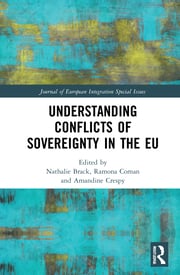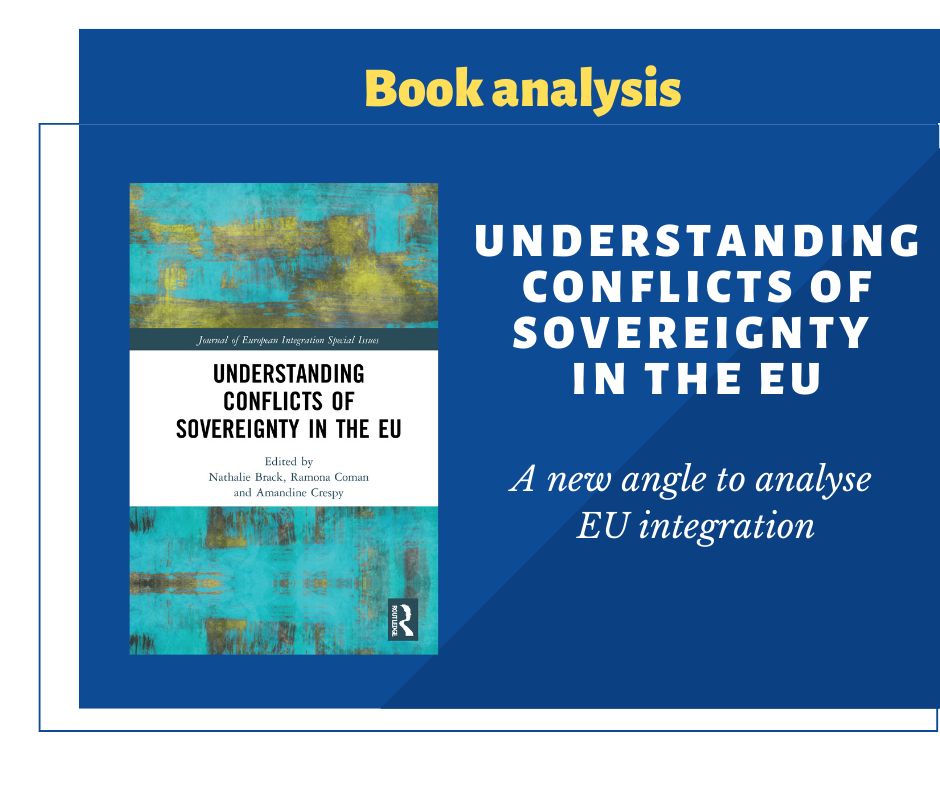 Francisco de Araujo Vásquez was research assistant in the project “Conflicts of Sovereignity in the EU” (financed by the FWA), and conducted by Nathalie Brack, Ramona Coman and Amandine Crespy.
Francisco de Araujo Vásquez was research assistant in the project “Conflicts of Sovereignity in the EU” (financed by the FWA), and conducted by Nathalie Brack, Ramona Coman and Amandine Crespy.
He holds Bachelor and a Master’s degree in Political Science from the Université libre de Bruxelles is pursuing a Master’s degree in European Studies, from the Faculty of Philosophy and social Sciences with the IEE label.
In the framework of the SovEU research project (Conflicts of Sovereignty in a European Union in Crisis) conducted by Nathalie Brack, Ramona Coman and Amandine Crespy (IEE/CEVIPOL) with Christopher Bickerton and Julia Rone (University of Cambridge), the notion of sovereignty and the relevance of sovereignty conflicts in explaining ongoing developments in EU integration were explored in the new book Understanding Conflicts of Sovereignty in the EU, published by Routledge and as a special issue for the Journal of European Integration.
Going beyond the traditional academic analysis opposing national sovereignty and European integration
The book’s first chapter, by Nathalie Brack, Ramona Coman and Amandine Crespy focuses on exploring and detailing the notion of conflicts of sovereignty. Going beyond the traditional dichotomy between national sovereignty and European institutions, the authors look at how new sovereignty conflicts have manifested themselves in recent debates on issues like migration, economic policy and democracy and the rule of law. In their analysis, the authors incorporate new dimensions such as popular sovereignty as well as parliamentary sovereignty which cause conflicts within national arenas and have become increasingly central in the discourse of both populist and mainstream politicians. It is also in this first chapter that are posed the principal questions which set the tone and the course for the book: “On which dimensions of sovereignty do today’s conflicts crystallize? By which actors and how are they articulated? What are the implications of these ‘old’ and ‘new’ claims to sovereignty for the EU polity as a whole?”
Conflicts of sovereignty in political discourse
Arthur Borriello and Nathalie Brack’s second chapter focuses on a comparative analysis of the discourse of four populist parties over the period 2012-2017, namely the Front National, the UK Independence Party, the Movimento 5 Stelle and Podemos. The authors state that one of the most significant characteristics of these parties’ discourse is their reliance on the idea of sovereignty and that they are the ones who truly represent the “people”. By studying the framing of the notion sovereignty made by these parties in relation to the economic and migration crises in particular, the authors argue that the traditional opposition between EU integration and national sovereignty is insufficient to explain developments at the national level, as different meanings of sovereignty are mobilized by these parties. They also recognize that the question of heterogeneity is an important piece of the puzzle which is required to understand the full picture; with the economic and migration crises having affected member states in different ways, these differences then find their way in the various forms of contestation of EU integration which can be observed subsequently.
In the third chapter, Ramona Coman and Cecile Leconte analyse the discursive strategies deployed by right-wing governments in Poland, Austria and Hungary to contest EU authority in key areas of state power and specifically within the context of the migration crisis and the rule of law. The authors show through their analysis that the classical national vs. supranational sovereignty dichotomy has been supplemented in recent years by the apparition and the evolution of a new type of discourse which contests EU authority in the name of European (Christian) values and a common European identity “defined in opposition to multiculturalism and political liberalism” which are framed as being incompatible with those very values and identity. The new sovereignty dimension explored here is therefore not specifically linked to particular conceptions of popular or parliamentary sovereignty but rather it is the nature of the new sovereignty claim which is novel, as a claim based on a specific notion of common identity which ultimately aims to alter the EU’s liberal foundations.
Conflicts of sovereignty across polities and peoples
Amandine Crespy and Stella Ladi focus on the question of popular sovereignty and recent conflicts which have involved this particular dimension, more specifically through a case study of the 2015 Greek bailout referendum. In this fourth chapter, the authors argue that the Greek case demonstrates that referenda which involve questions which also fall under the authority of other governments and other demoi do not serve to increase popular sovereignty when they are negative, and that turning to referenda for instrumental purposes can in fact further inflame conflicts of sovereignty. Furthermore, the authors look in detail at different conflicts of sovereignty linked to the referendum: the conflict between Greek national sovereignty and EU supranational sovereignty relative to monetary policy and the ECB’s role during the crisis, the conflicts of sovereignty between member states within the Eurogroup which reflect interstate competition dynamics or even the conflicts of popular and parliamentary sovereignty among the different European demoi.
Conflicts of sovereignty in constitutional and legal matters
Christopher Bickerton’s contribution focuses on the case of the United Kingdom and Brexit and more specifically attempts to reconceptualize the European “sovereignty wars” through the idea of conflicts of sovereignty. A significant part of the author’s argument in this fifth chapter focuses on how the EU has provided a context and background which has influenced nation-states in revisions of their constitutional apparatus, which resulted in the UK importing “via its EU membership an increasingly continental mode of the constitutional rule” which was only possible and tolerable as long as emerging tensions from these changes with the doctrine of parliamentary sovereignty were not overpowering. Once these tensions reached a certain point, however, they were drawn into open, demanding a resolution which culminated with Brexit. Bickerton concludes that conflicts between competing understandings of sovereignty at the national level may become more important to explain tensions relative to EU integration than the classical dichotomy between national and supranational sovereignty.
In the sixth chapter, Sabine Saurugger and Fabien Terpan look specifically at how the Court of Justice of the European Union (CJEU) has ruled on cases involving conflicts of sovereignty, in particular through the analysis of nine rulings involving matters linked to the Economic and Monetary Union (EMU) since the beginning of the financial crisis of 2008. The aim of the analysis was to determine whether the Court consistently defended supranational sovereignty and European integration in its rulings or whether it also took parliamentary, popular and national sovereignty into account. Their findings point to the fact that the CJEU has exclusively ruled in ways favourable to supranational sovereignty to the detriment of national sovereignty irrespective of the nature of the plaintiffs, making their findings are consistent with research on constitutional courts which shows that in the economic field, Courts generally do not question supranationally or domestically democratically decided rules.
Conflicts of sovereignty in new domains of EU integration
Denis Duez and Martin Delheixe focus their analysis on the case of the European Border and Coast Guard Agency (Frontex) in the seventh and penultimate chapter of the book, which presents a singular opportunity to revisit the classic conflict between national states and the EU through the adoption of traditional, post-sovereignist, and post-traditional conceptions of sovereignty. The authors’ analysis shows that a post-traditional conception of sovereignty is the most useful to understand the ongoing integration of EU external border management and its implications. They conclude that the present EU border management landscape does not match with any single political actor’s preference but rather is clearly the result of a compromise born out of contentious deliberation. This leads the authors to the idea that with such an unsatisfactory state of affairs, this compromise will not be sufficient to quell future sovereignty claims around the management of EU external borders.
Conflicts of sovereignty in new theoretical approaches
Finally, Jan Pieter Beetz’s contribution in the eighth chapter examines the relationship between popular sovereignty and the EU’s democratic deficit from a theoretical perspective. The author argues that in the aftermath of Brexit and the refugee and Euro crises, conflicting political visions revolving around popular sovereignty have emerged in debates around the democratisation of EU decision-making processes. The analysis differentiates four relevant conceptions of popular sovereignty relevant for this debate and discusses their implications for parliamentary representation. In the end, the author points out that “different conceptualisations of the same principle result in incompatible institutional designs for democratising EU decision-making”, suggesting that these fundamental normative disagreements which continue to frame and underpin ongoing debates on democracy in the EU are likely to be a recurrent challenge going forward.

If you are interested in the book Understanding Conflicts of Sovereignty in the EU, you can purchase it via the Routledge website.




